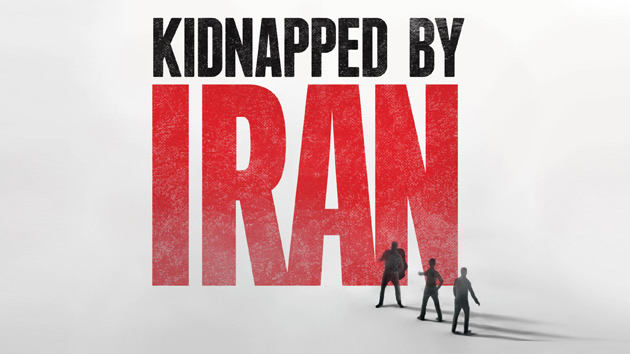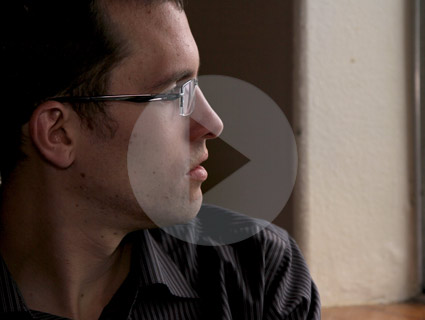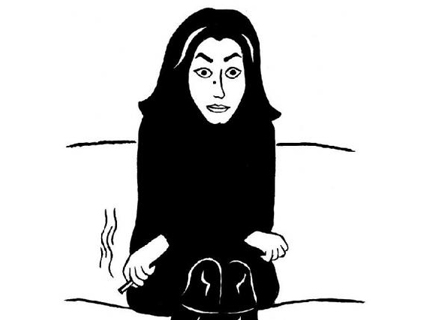First there was the initial optimism, the confidence that this was all a misunderstanding, and once they found out who you really were they would let you go. Then there was your conviction that you were innocent, that you had nothing to hide. There was the giving of email passwords to prove it. There was the moment you realized that they had seen everything, that there was nothing else you could do to prove your innocence, and that even if you had something, it wouldn’t matter—they would keep insisting, childishly, that you were a spy. There were the interrogators’ claims that no one was trying to contact them about you. And finally, there was the despair as you watched them take all of the little facts they’ve gathered from your life and use them to concoct a story wherein you are the mastermind of a plot to undermine the Iranian government.
As I watched Jon Stewart’s first film, Rosewater, I found myself asking again and again how it was that Maziar Bahari (played by the Mexican actor Gael Garcia Bernal) went through so many of the same stages that I did when I was imprisoned in Iran. Was it a testament to the machine-like consistency of the regime’s methods, or to Stewart’s skill as a director? Rosewater is based on the travails of Bahari, an Iranian-Canadian Newsweek journalist. Save a couple of dramatic embellishments, it follows Bahari’s eponymous memoir closely. The first half of the film takes us through his experience of Iran’s 2009 elections and the abortive Green Revolution that followed. The second, more poignant, half follows his arrest and imprisonment.
A month after the Revolutionary Guard arrested Bahari at his mother’s house, I was captured near the Iran-Iraq border while hiking with two friends. I was placed in the same prison as Bahari, in a cell not far from his. He ended up staying four months; I was there for 26. When we were captured, Bahari’s interrogators told him they had captured the heads of the CIA mission against Iran. (They accused him, meanwhile, of masterminding a Western media spy ring under the auspices of Newsweek.) In his cell, Bahari told me later, he heard my voice. He heard Sarah Shourd, my fellow prisoner and now my wife, sing.
There is something incredible about watching someone on screen go through the precise moments that you, too, have experienced, like the transcendental feeling of reaching your hand into a beam of sunlight coming over the wall the first time you go outside. When Bahari was allowed to call his wife, I teared up, knowing the rare mixture of relief and freedom he felt when he heard the voice of his beloved, who was doing everything she could to get him out. (Sarah was released a year before I was.) I laughed with Bahari as he danced in his cell after the phone call—far and away the most powerful scene of the film—oblivious to his interrogator’s fury. As the months went by, Bahari combed through his memories like old books. He found what songs he knew and listened to them in his head. Family members imprisoned by the current and former regimes became his imaginary company.
Unlike me, Bahari was beaten by his interrogator. I would expect an American film about Iranian imprisonment to exaggerate such violence, but Rosewater actually downplays it. “Beatings were the exception,” Stewart told an interviewer at the screening. “Solitary confinement was the rule.” He also wanted to help people understand what it’s like to be placed in isolation. “We do this in this country.” Stewart said. “We keep people in solitary, and it’s insanity!”
The film expertly captures the banality—and absurdity—of the interrogations—perfect fodder for Stewart’s sense of dark comedy. Bahari’s interrogator is obsessed with porn, and he views New Jersey (Stewart’s home state) as a den of iniquity. “All I know is it’s a godless place, like the one you were trying to create in this country,” he said. “With naked women and Michael Jackson music!”
The interrogator is sure he has cracked his case when he comes across a Daily Show clip in which “senior foreign correspondent” Jason Jones, clad in a chafiye scarf and sunglasses, interviews Bahari in a Tehran café. In the clip, Jones plays the aggro American journalist trying to expose what makes Iranians “evil.” “Iranians and Americans have much more in common than difference,” Bahari replies. The clueless interrogator takes the whole thing literally, accusing Bahari of meeting with an American spy: “Why did you tell this man Iran and America have something in common? Khomeini said America was the Great Satan. We threw them out the door and you bring them back through the window.”
What sets Rosewater apart is that it depicts most Iranians as people we can relate to—something American films, as a rule, fail to do. Ben Afleck’s Academy Award winning Argo has exactly one likeable Iranian character; the rest are menacing and often appear in mobs. Rosewater‘s depiction of Iran is closer to reality: a complex society divided between socially conservative and liberal. People have parties. Some drink. They dream about a better future rather than an idealized past.
Toward the end of the film, Stewart captures the twisted game of the forced confession. Under threat, Bahari went on Iranian television and said that Western media, in particular Newsweek, CNN, and the New York Times, had helped create Irans post-election uprising. “Everyone watching these confessions knows they are a show,” Stewart saidin the post-screening chat. “There is a uselessness to them. A daily grind.” To him, the confessions epitomize the “bureaucracy of torture” that perpetuates itself without reason.
He is wrong about that, though. While torture in Iran does have a faceless bureaucratic element, the confessions serve a calculated purpose. Their blatant falsehood is an essential part of their function: They demonstrate not only that the truth doesn’t matter, but that the regime creates the truth. The confessions help relay to the public what the regime considers punishable (in Bahari’s case, writing for an American magazine) and the acceptable ideological line (that the Green Revolution was caused by Western media).
We should not be so glib, Stewart told the audience, as to think we have nothing to do with what thousands of people like Bahari go through in Iran. As part of the CIA’s mission to overthrow the democratically elected Mohammad Mossadeq in 1953, the agency placed anti-Mossadeq stories in the Iranian and US media. “We overthrew their government in 1953 using the media in the way they were accusing Maziar of doing,” he said. “So we are complicit in their paranoia.”
Stewart stressed that while the specifics are unique, he wanted his film to tell a universal story—which is one reason just part of the cast is Iranian. (The other is that Iranian expats who appear in Rosewater may never again get to travel to their homeland without risking imprisonment.) But the cruelty the film portrays “is not just a problem in Iran,” he said. “It’s a problem of regimes who set up repressive apparatuses. It’s other authoritarian regimes. It’s allies of the United States—and it’s the United States itself.”
Countless journalists and activists are still behind bars in Iran, many of them since the 2009 election protests. “Finally, I was free,” Bahari says at the end of the film, sitting on an airplane preparing to leave the country, “but my joy was tempered by those I left behind, those who did not have the privilege of international attention.”
The credits rolled. The audience applauded. I put my arm around my wife, and held her close.


















